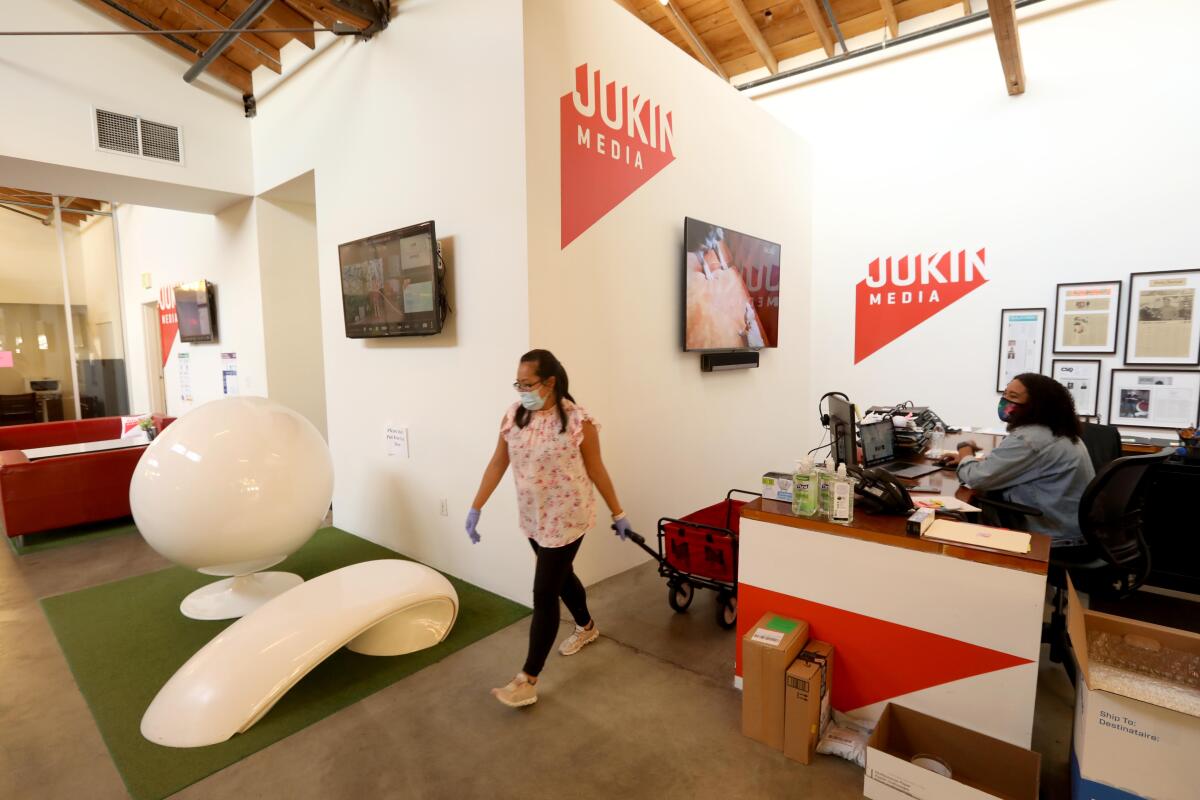Newsletter: No more masks at work? California’s rules are on track to change

Good morning. I’m Rachel Schnalzer, the L.A. Times Business section’s audience engagement editor, back with our weekly newsletter. Mask-optional workplaces are almost here, as long as a proposal from California’s workplace safety agency gets final approval.
As the state moves toward lifting many COVID-19 pandemic restrictions June 15, the California Division of Occupational Safety and Health, known as Cal/OSHA, is proposing to loosen the emergency workplace rules it established late last year.
Among the proposed changes: Workers in indoor spaces could stop wearing face coverings, perhaps as soon as Tuesday of next week — though everyone present would have to be fully vaccinated against COVID-19, and the employer would have to verify each worker’s vaccination status. Distancing requirements for workers also would be eased.
My colleagues Luke Money and Rong-Gong Lin II published a detailed breakdown of what you need to know about Cal/OSHA’s proposal. Here are some highlights, along with some additional updates:
Is this really going to happen?
The Cal/OSHA proposal got one crucial approval a few days ago. It’s still subject to review by the state Office of Administrative Law. But that office is expected to approve it, and new rules could go into effect as soon as June 15.
Under Cal/OSHA’s proposal, who could go without a mask while working indoors?
Most workers would be allowed to bare their noses and mouths if every other person in the room does not have COVID-19 symptoms and is fully vaccinated. If anyone present is not fully vaccinated, masks would still be mandated.
People are fully vaccinated two weeks after receiving their second dose of the Pfizer-BioNTech or Moderna vaccines or the single shot of Johnson & Johnson‘s vaccine. To comply with the rules, employers will need to have their employees’ vaccine records on file.
Employees of retail stores, restaurants and other establishments where workers interact with the public would still need to wear masks. The rule change also would not affect employees in some other settings, such as hospitals.
What else does Cal/OSHA’s proposal cover?
The agency also recommends ending the requirement that employees remain distanced from others. That should kick in July 31, it suggests.
Until then, when dealing with employees who work inside or work at outdoor events of 10,000 people or more, employers will need to either continue distancing those workers or offer respirators such as N-95 masks.
Do vaccinated workers need to keep getting screened for COVID-19?
The state’s guidance just changed. On Monday, the California Department of Public Health said nonhealthcare workers who are fully vaccinated do not need to be screened for COVID-19.
In addition, the department said, fully vaccinated people don’t need to be tested after exposure to someone who has COVID-19 unless the fully vaccinated person is showing symptoms or working or living in a crowded environment.
Can some places keep stricter rules?
Yes, businesses and other employers can choose to require employees or customers to wear masks even after the state no longer mandates it.
Were some pandemic-era changes recently extended?
California’s COVID-19 state of emergency order — which gives Gov. Gavin Newsom and health officials broad authority to temporarily impose new rules and restrictions — will remain in place beyond June 15, Newsom said Friday.
California is also extending the ability of restaurants and bars to serve alcoholic drinks in outdoor dining areas, for delivery and to-go orders through the rest of the year.
Curious about what a reopened Los Angeles County will look like? Read the full story.
Other stories you may find helpful
◆ COVID-19 restrictions protected California’s economy, and now it’s poised for a “euphoric’” rebound, Margot Roosevelt reports.
◆ Unsure about the difference between a Roth IRA and a Roth 401(k)? Certified financial planner Liz Weston explains how to pick the best retirement account for you.
◆ Want free accommodations when traveling? Look into housesitting sites, SideHusl.com’s Kathy Kristof suggests.
◆ A solar-power company sold a 25-year contract to a 91-year-old woman, David Lazarus writes. After she died, the company refused to cancel her contract.
◆ Fisher-Price ignored safety warnings over its infant sleeper linked to dozens of deaths, an investigation found. Now, Sasha Hupka reports, lawmakers say they’ll enact tougher consumer protection laws if the company doesn’t shape up.
◆ Hashtags often feel dated and cringeworthy. So why are influencers still using them? Brian Contreras digs into the importance of hashtags on platforms such as TikTok.
◆ The California recall seems to be commanding the attention of people everywhere — except in California, columnist Michael Hiltzik writes. Why do East Coast TV anchors care about this?
One more thing
Venture funding is a major gateway to success for those starting a company, especially those in tech. But most venture capitalists still ignore Black, Latinx and female entrepreneurs.
My colleague Ronald D. White recently reported on the impenetrability of venture funding for people of color and women -- as well as the people who are trying to change that.
“The disparity in who the venture capitalists are and where their money goes is just phenomenal,” Katherine Klein, a management professor at the University of Pennsylvania’s Wharton School of Business, told White. Read the full story here.
Have a question about work, business or finances during the COVID-19 pandemic, or tips for coping that you’d like to share? Send us an email at [email protected], and we may include it in a future newsletter.
Inside the business of entertainment
The Wide Shot brings you news, analysis and insights on everything from streaming wars to production — and what it all means for the future.
You may occasionally receive promotional content from the Los Angeles Times.




